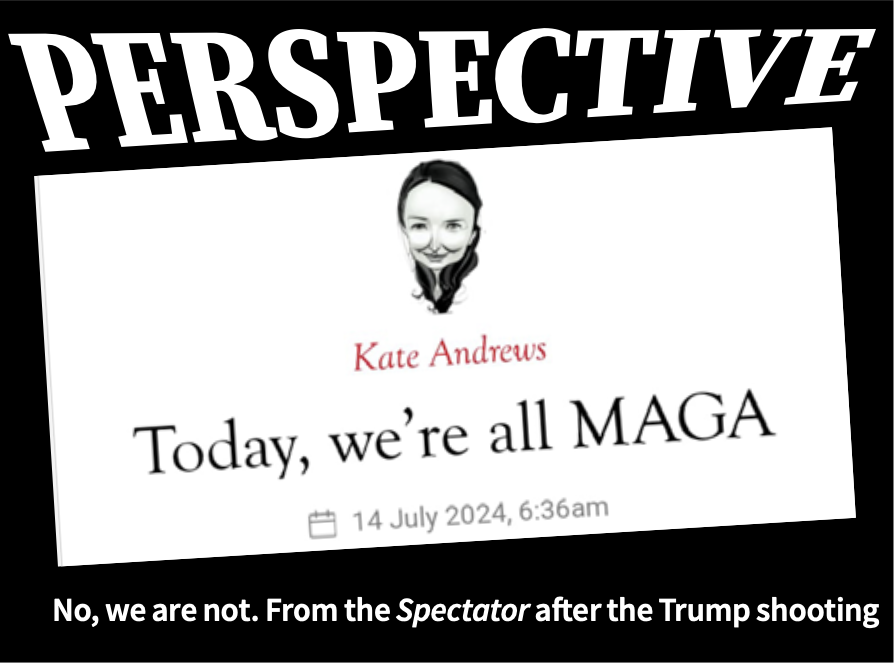It is right to condemn the attempted assassination of Donald Trump. Democracy relies on the ballot box, not the rifle.
The root causes should be investigated as thoroughly as the attack. If political leaders use the language of division, derogation and contempt, while encouraging and condoning attacks on democratic institutions, they incite violence among the fringe inclined to use it.
As Tanit Koch points out in her excellent (both serious and amusing) Germansplaining in TNE #396, political insults have been around for a long time, but there is a world of difference between suggesting half the cabinet are asses and the inflammatory rhetoric of the likes of Trump and Nigel Farage.
We in Europe likewise need to be on our guard. Parliaments do have rules and a means – however weak – to enforce them. There is no such regulation of the media, social or otherwise, and those who would undermine our democracy know how to exploit and abuse that. Most people will shrug it off or hope it goes away. It will not.
Rex Nesbit
The hypocrisy across the board in response to the Donald Trump shooting is staggering, given the levels of gun violence still allowed to terrorise the society of ordinary American citizens. The differential Joe Biden cited, of “political” violence, exemplifies how immune he and their ilk generally feel to this.
Julie Elizabeth
How strange that your Great European Lives section, which I have belatedly realised marks the week in history when its subject died, covered Ivana Trump in TNE #396. She died on July 14, 2022 and as we now know, her husband almost followed her on July 13, 2024.
Ros Rice

Hot off the press
Liz Gerard’s “Our disgracious press” (TNE #396) was a great article! The Telegraph was hysterical in the run-up to the election; it would have been worrying if anyone took them seriously. Glad we can tune them all out now.
Lisa Wrake
Let the Tory-backing papers carry on not listening. For all I care they can “not listen” themselves into obscurity, irrelevance, and hopefully bankruptcy.
We, however, blighted millions though we may be, must continue to listen as they continue to drop poison into the ears of the misguided. Dog whistles aren’t dog whistles if you can hear them.
Stuart Shingler
For those who enjoyed “Our disgracious press”, can I suggest a read of Brian Bilston’s poem on why he will never read the Daily Mail? “I would rather eat Quavers that are six weeks stale, blow dry the hair of Gareth Bale, listen to the songs of Jimmy Nail, than read one page of the Daily Mail” etc.
Peter Sears
Open and closed
I read “Fear and loathing in Clacton” (TNE #396) with, well… fear and loathing. That said, I believe we need a grown-up, pragmatic and informed debate about how we manage immigration, and how much we actually need it.
Of course we cannot shirk our responsibility to refugees and asylum seekers. But an open-door policy seems unfeasible.
New housing developments require transport networks and local infrastructure. Many existing conurbations are deprived of those services. Deprivation feeds prejudice and resentment.
Yes, there’s a skills shortage in certain areas, but there are around 9.3 million working-age people not seeking employment. We should provide the medical and psychiatric care that would let the long-term sick recuperate, and then rejoin the workforce if and when they’re ready – a win-win.
We’ll always need workers from abroad, but we should fund medical, nursing and midwifery training in the UK; it’s surely unethical to poach trained personnel from poorer countries that desperately need them.
So I’d push for a judicious immigration policy that allows for future waves of fugitives, including those from regions no longer habitable thanks to climate change.
Vera Lustig
Walton-on-Thames, Surrey
We shouldn’t overlook the possibility that a sizeable chunk of Reform votes came from voters who used it as a protest against, rather than a vote in favour. I certainly hope this is the case, rather than it being an accurate measure of genuine support for the Farage Ltd. brand of political thinking.
Gina Ford
Fiscal statement
Matthew d’Ancona is correct to say in “The promise and the threat” (TNE #396) that Keir Starmer and Rachel Reeves’s fiscal rules will “as things stand” see a return to austerity and cuts in exactly the areas that the present restive, disillusioned, untrusting and easily disappointed electorate are craving to see improved.
Reeves makes much of her time working for the Bank of England. She should therefore listen to the advice of its former chief economist Andy Haldane, who in recent television interviews proposed that these fiscal rules should be “junked” for something more sensible that would enable the investment required in the economy.
Also, were Labour’s much-vaunted growth to be redefined as the increase in economic activity directed towards rebuilding public services and turbocharging a green transition, that could be funded substantially by a redirection of domestic savings. Tax expert Richard Murphy has shown how to positively involve millions of UK savers in this transition by ensuring that all new Isa funds and 25% of all new pension contributions are invested in social and green infrastructure projects.
This approach could mean that eventually up to £100bn of funds a year might be made available for that purpose. Sticking to fiscal rules will be a Farage recruiter and must be ‘junked’.
Colin Hines
East Twickenham, Middlesex

I’m relieved that Starmer has won. But please, please, can we abandon the trope about the “catastrophe” of Labour under Corbyn?
In the 2017 election, the vote share for Labour was 40%, way more than Starmer has just achieved. Even in 2019, it was only two points lower than in the current election. On the other hand, the profoundly depressing statistic is that 14.3% of those who bothered to vote this time voted for Reform.
Populism thrives on inequality. “Brick-by-brick economic stability” is meaningless to those at the bottom of the heap. Unless the current government does something radical in the direction of redistribution, in five years’ time we will be facing an (even more loathsome) right wing rebound.
Helen Porter
Newtown, Powys
Swing state
Re: “The big swing” by James Ball (TNE #396). The jury was out with me over Ed Davey. I must say now that finding out more about his dedicated and committed care for his disabled son, John, and seeing Davey speaking openly about the innate responsibilities and indeed the joy of caring has altered my opinion. He also placed in the spotlight the plight of carers and their myriad daily struggles.
I first thought his stunts were plain daft, but then I began to appreciate his contagious joie de vivre in undertaking them.
Judith A Daniels
Cobham, Norfolk
My enthusiasm for Ed Davey does not match that of James Ball. The Lib Dem “surge” has been won not by a coherent manifesto or even by amusing, well-planned stunts but simply by tactical voting to punish the Conservatives.
Tim Wright
Ross Hamilton is concerned that a proportional voting system might have handed power to a Tory/Reform coalition (Letters, TNE #396). However, under PR the Tories would have won 154 seats and Reform 93 seats; well short of a Commons majority.
On the other hand, Labour would have won 220 seats, and they could, with the support of the Lib Dems (79 seats) and Greens (44 seats), have formed a coalition government, albeit with a slim majority.
Tim Stevens
Deeping St James, Cambs
Full house!
Re: Wipeout bingo, TNE #395 (pictured below). There, job done. It took a while but there you go. House!
Chris Purcell
London

A future for all
Nigel Warburton (Everyday Philosophy TNE #396) unfortunately perpetuates a frequent error about Rousseau. When he wrote “L’homme est né libre et partout il est dans les fers” (Man is born free and he is everywhere in chains)he was not referring to the birth of all men, but to primitive man.
Second, I object to Lesley Gibson-Meredith’s suggestion (Letters, TNE #396) that people over 70 should not have had in a vote in the referendum because “it was not their future”. People over 70 are living for up to three more decades in increasing numbers.
Carolyn Beckingham
No strings attached
An interesting detail which Peter Trudgill’s “A medieval jig with a violin” (TNE #396) didn’t mention was that the name oboe, which indeed originates from the French hautbois, comes into English via Italian. Its spelling replicates in Italian orthography the original French pronunciation, which changed around the early 19th century.
At the time, the Italian transcription was adopted, the French -ois was pronounced -we (oe in Italian spelling). It’s now -wa, which would be -oa in Italian. English and Italian have frozen the earlier French pronunciation.
Max Gauna
In Portuguese, “uma viola” is a six-stringed guitar. An orchestral viola is “viola de arco” (bowed viola), whereas “uma guitarra” is the multi-stringed pear-shaped instrument used to accompany fado.
Rosemary Forlin
New science
The idea of a new science column in TNE is an excellent suggestion by Graham Lee (Letters, TNE #396).
Could we add to this the European dimension? What is going on in the Horizon programme? The latest news from Cern? What’s happening at the European Space Agency?
Andrew Lashbrooke-Small
More on this in the next issue – Editor.
Belly laughs
Re: Germansplaining. Tanit Koch is my favourite Kraut. My belly is still aching mit lachen from the last one!
Rod Sutcliffe
Hebden Bridge, West Yorkshire
BELOW THE LINE
Comments, conversation and correspondence from our online subscribers
Patience Wheatcroft’s reminder of the Tories’ self-description as a ‘big tent’ (“Game of thrones”, TNE #396) is a reminder that Labour often refers to itself as a broad church. Labour’s problems have always stemmed from this ecclesiastical comparison in that divisions have usually arisen because of theological difference. The Tories now appear to have an issue more circuslike. There are clowns, elderly (and largely toothless) animals, and acrobatic shape-shifters all fighting for space in the ring. The fact that the ringmaster at the circus is often kitted out in the uniform of an Old Etonian simply completes the picture.
John Dallimore
Roger Domeneghetti’s “When Mussolini won the World Cup” (TNE #396) was excellent. While I think we in Britain would never allow Nazi or Stalinist excess, I could believe we might, as a nation, reach a form of British Mussolini-style “national corporatism”. If interesting stories about sport and politics are your gig, Simon Kuper’s Football Against the Enemy is well worth a read.
Em Jackson
Re: Bonnie Greer on The Citadel (Vintage, TNE #396). Its writer AJ Cronin was a doctor as well as an author. He went on to work closely with Aneurin Bevan on the foundation of the NHS. In the 1960s, he scripted episodes of Dr Finlay’s Casebook, based on some of his semi-autobiographical stories from the 1920s. Some episodes are available to view or download, and they are remarkably dark and gritty for the time. And to my surprise, a couple of episodes highlight that there was dangerous anti-vax propaganda already being pushed back in the 1920s, with rich celebrities funding the publication of magazines full of quack ideas.
Ian Anderson
Re: Your Great Life of Walter Gropius (TNE #395). When I was a young student at Dartington College of Arts, there were several Bauhaus-designed houses nearby. The first time I went into one, I felt something odd, almost disconcerting. It wasn’t until my third or fourth visit that I realised what it was; there were no corners. Everything was elliptical. Ever so slightly and in no way emphatic – just subtle curves where there should be corners, with the effect of creating space, light and lightness. I thought it was genius.
Richard Riddle
JOIN THE CONVERSATION
Subscribe and download our free new app to comment and chat with our writers



